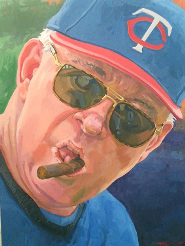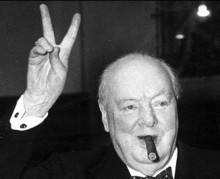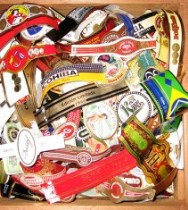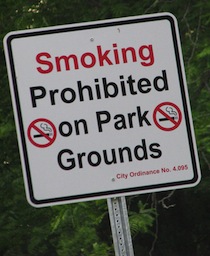[Editor’s Note: The Cigar Maker is the story of a Cuban cigar maker who battles labor strife and vigilante violence in 1900’s Tampa. It recently won the Bronze Medal at the Independent Publisher Book Awards and has been named a Finalist in ForeWord Magazine’s 2010 Book of the Year Awards. Click here to learn more.]
 “Boxing? I should sell you to the circus!†Olympia stood on the porch with her fists on her hips and glared at the boys below. Lázaro’s crooked nose was smeared with blood and Javier wavered in a drunken daze with blotches of red coloring his shirt and tie. “Get inside, the both of you, before I knock your teeth out!†Lázaro climbed the steps and as he passed his mother and entered the house, Olympia slapped his backside. Javier tried to follow but Olympia stood in his way. “And why didn’t you stop him?â€
“Boxing? I should sell you to the circus!†Olympia stood on the porch with her fists on her hips and glared at the boys below. Lázaro’s crooked nose was smeared with blood and Javier wavered in a drunken daze with blotches of red coloring his shirt and tie. “Get inside, the both of you, before I knock your teeth out!†Lázaro climbed the steps and as he passed his mother and entered the house, Olympia slapped his backside. Javier tried to follow but Olympia stood in his way. “And why didn’t you stop him?â€
His jacket was folded over his arm and his hat was in his hand; his eyes sagged, tired and drunk from a long night on the town. Javier shrugged. “I’m not his father. He can do what he wants.â€
“Be careful what you say or I’ll throw you out of this house!†They went inside where Lázaro sat on the couch in the parlor. Josefina was sitting on the floor reading a book, which she set aside when her brothers walked in. Javier joined Lázaro on the couch and Olympia stood before them with her fists still locked against her hips. She said to Lázaro, “If you spill blood on that couch, you will pay for a new one.â€
“Fine,†Lázaro said and dabbed his nose with Javier’s bloody handkerchief. His eyes were closed, his head hurt, and he wished she would leave him alone so he could rest.
Josefina rose. “I’ll get ice and a fresh towel.†She crossed the parlor and disappeared down the hallway, passing Salvador as he entered the room. “Bring a dirty dishrag instead!†Olympia called to Josefina. “I don’t want to ruin another good towel with this one’s blood!â€
Salvador came into the parlor with his shirt off wearing only his pants and a belt, almost ready for bed. He saw Lázaro on the couch a mess of bruises and Javier beside him with a bloody shirt. Javier’s normally perfect hair was disheveled and both boys looked guilty as thieves. “Now what is all this about?†He stood next to Olympia and glared sternly at the two boys.
“He entered a contest,†Javier began.
Olympia interrupted. “Let him say it.â€
All eyes went to Lázaro, who sighed and looked to the floor. Finally he said, “I’m not going to sit at a factory workbench all day.â€
Salvador and Olympia shared a glance; they had expected this moment. Inside of her anger, Olympia found that she understood, but she tried not to let it show by crossing her arms and tapping a foot. “You entered a contest?â€
He nodded. “It was a great fight,†Javier said merrily. “All the men were cheering.â€
“Javier!†Olympia pointed at her oldest son, “If you don’t shut your mouth, I’m going to break your nose!â€
“What’s wrong with boxing?†Javier asked innocently. “He’s good at it, and if he keeps practicing, he can make money for the family.â€
Olympia asked Lázaro, “How much money did you make tonight?”
He shook his head. “None.â€
“Why not?â€
“Because I didn’t win.â€
Javier said, “I made ten dollars.â€
“You bet against him?†Olympia asked. Javier shrugged his shoulders and nodded. Olympia held out her hand. “Give me half.†Javier was surprised. “I spent it already.â€
“You already spent ten dollars?†Olympia said doubtfully as she took a step closer. She didn’t believe he already spent ten dollars and made sure her face showed him how angry she would be if he had.
He shrugged. “Most of it.â€
“So you’ve just lied to your mother? Give me what’s left.†She waited with her hand extended as Javier reached into his pocket and handed her a couple of crumpled bills and some change. “Two dollars? You good for nothing fool,†she folded the money into her palm.
Josefina returned from the kitchen with a fresh towel and a handful of ice, which she handed to Lázaro. Olympia said to Javier, “Your father and I want to talk to Lázaro.â€
Javier and Josefina dismissed themselves and went into the boys’ bedroom where they sat with E.J. and listened. The walls were so thin it was impossible to avoid hearing everything that was said. Salvador moved to the couch and sat beside Lázaro while Olympia remained standing, her hands back on her hips. Salvador said, “Let me look at your nose.â€
Lázaro sat back, allowing his father to inspect his face. Black bags would form under his eyes, his nose and mouth were caked with dried blood, and his nose was smashed, but the bleeding had stopped. “Your nose is broken again but it doesn’t look too bad. Do you still have all of your teeth?†Lázaro clenched his teeth and opened his lips to show his father that he did.
Olympia shook her head. “You’re going to come home dead one of these days, little raccoon.â€
Salvador said, “Lázaro, fighting and scuffling with your brothers is one thing but boxing is no way to make a living. You don’t make real money unless you turn pro and you don’t turn pro unless you fight constantly. In the meantime you’ll break your nose, your ribs, your hands, and your neck.â€
Olympia added, “And when you’re hungry with broken hands you won’t be able to work any other jobs and you won’t be able to eat.â€
“Boxing is a life for men with no other skills,†Salvador said.
“Boxing is a skill,†Lázaro insisted as he held a handful of ice to his nose.
“But it is not work. How are you going to feed yourself?â€
“I won’t go hungry,†Lázaro said. “There is a man visiting town who trains professional boxers in New Orleans.†Olympia threw her head back and forced an exasperated laugh. “You’re going to waste your life on some circus clown?â€
“He’s not a clown.â€
“You are a clown for even considering this ridiculous stunt!â€
Lázaro finally lost his temper and yelled, “Then why don’t you kick me out of this house so I can go about my life as I please?â€
Olympia pointed at him. “The only place you’re going is back to the workbench so you can earn money for this family. You will do your part like every one of us.â€
Then Lázaro said something that not only enraged Olympia, but hurt her feelings in a way that Lázaro would regret for the rest of his life. He shouted, loud enough for the neighbors to hear, “You don’t work! You don’t do anything!â€
Olympia’s eyes opened wide and black as the volume of her voice became frighteningly lower. “What disrespect have you just shown your mother?â€
Lázaro rose to face Olympia. Salvador tried to hold him back, but Lázaro broke away and stood face to face with his mother, looking down at her from above. “Papa, Javier and I work full time in the factory. Josefina is a nurse, and even E.J. is learning the trade. You stay home all day playing and bossing everyone around.â€
She took a step closer so their faces were inches apart. Though she was small compared to her son, to Salvador she looked as if she had risen to the same height. There was a fury in her eyes unlike any Salvador had ever seen. In a deep, controlled voice that stifled her rage, Olympia said, “Are you telling me that I don’t wash your clothes and keep your bed clean? That I don’t fix your daily meals? That I’m not awake long after everyone has gone to sleep, and that I’m not the first to rise in the morning? When you were five and wandered over a beehive, and ran home crying like a baby, it was my shoulder you cried on! I was the one who treated your stings! I looked after you when you were sick, I picked you up when you fell, I carried you when you couldn’t walk, and I fed you when you could not eat. And when you were an infant, and didn’t know your foot from your ear, it was me who wiped your ass and cleaned you off after you had shit all over yourself! So if you think I don’t do anything, then get the hell out of this house and do it yourself!â€
Her eyes watered and tears fell immediately. “I am so mad I can no longer look at him,†her voice cracked as she stomped down the hallway, into the kitchen and out the back.
–Mark M
photo credit: The Cigar Maker
 Kelly is having his number retired this year. After leading the team to two World Series titles and then sticking around to work in the Twins front office and occasionally moonlight as the color commentator on Twins TV broadcasts, it’s fitting that the franchise would retire #10. After all, he’s exalted in Minnesota baseball, the most successful manager in Twins history, and the only one to lead the Twinkies to a World Series title, which he did not once but twice.
Kelly is having his number retired this year. After leading the team to two World Series titles and then sticking around to work in the Twins front office and occasionally moonlight as the color commentator on Twins TV broadcasts, it’s fitting that the franchise would retire #10. After all, he’s exalted in Minnesota baseball, the most successful manager in Twins history, and the only one to lead the Twinkies to a World Series title, which he did not once but twice.
 “Boxing? I should sell you to the circus!†Olympia stood on the porch with her fists on her hips and glared at the boys below. Lázaro’s crooked nose was smeared with blood and Javier wavered in a drunken daze with blotches of red coloring his shirt and tie. “Get inside, the both of you, before I knock your teeth out!†Lázaro climbed the steps and as he passed his mother and entered the house, Olympia slapped his backside. Javier tried to follow but Olympia stood in his way. “And why didn’t you stop him?â€
“Boxing? I should sell you to the circus!†Olympia stood on the porch with her fists on her hips and glared at the boys below. Lázaro’s crooked nose was smeared with blood and Javier wavered in a drunken daze with blotches of red coloring his shirt and tie. “Get inside, the both of you, before I knock your teeth out!†Lázaro climbed the steps and as he passed his mother and entered the house, Olympia slapped his backside. Javier tried to follow but Olympia stood in his way. “And why didn’t you stop him?â€ Ron Jaworski
Ron Jaworski  What a wonderfully simple (and true) declaration. So many people choose to smoke cigars that are new or expensive because they think those sticks will make them look cool. Others only choose cigars that have received the highest ratings, or those that are made by the trendiest cigar makers. Still others only smoke the biggest, the boldest, the darkest, or the thickest. And others hunt for certain flavor profiles.
What a wonderfully simple (and true) declaration. So many people choose to smoke cigars that are new or expensive because they think those sticks will make them look cool. Others only choose cigars that have received the highest ratings, or those that are made by the trendiest cigar makers. Still others only smoke the biggest, the boldest, the darkest, or the thickest. And others hunt for certain flavor profiles. Such lists are fun, as you compare your preferences with the list author’s. And sometimes you’ll realize there is a cigar you’ve wanted to try but haven’t, or maybe an old favorite that you’ve gotten away from for no particular reason.
Such lists are fun, as you compare your preferences with the list author’s. And sometimes you’ll realize there is a cigar you’ve wanted to try but haven’t, or maybe an old favorite that you’ve gotten away from for no particular reason. Now, nine years later, a look at the many laws in New York shows that smoking was just the beginning. In the time since then, a ban on selling food cooked with trans fats has gone into effect, and New York Mayor Michael Bloomberg has also gone after sugar-rich sodas. Bloomberg has pushed for reduced salt in prepared foods and the city council even proposed a complete ban on restaurants cooking with salt. And now the New York Post reports Bloomberg has his nanny-state sites
Now, nine years later, a look at the many laws in New York shows that smoking was just the beginning. In the time since then, a ban on selling food cooked with trans fats has gone into effect, and New York Mayor Michael Bloomberg has also gone after sugar-rich sodas. Bloomberg has pushed for reduced salt in prepared foods and the city council even proposed a complete ban on restaurants cooking with salt. And now the New York Post reports Bloomberg has his nanny-state sites  In early December, Camacho Cigars, a subsidiary of premium cigarmaker Davidoff of Geneva,
In early December, Camacho Cigars, a subsidiary of premium cigarmaker Davidoff of Geneva,  Patrick Ashby
Co-Founder & Editor in Chief
Patrick Ashby
Co-Founder & Editor in Chief Patrick Semmens
Co-Founder & Publisher
Patrick Semmens
Co-Founder & Publisher George Edmonson
Tampa Bureau Chief
George Edmonson
Tampa Bureau Chief